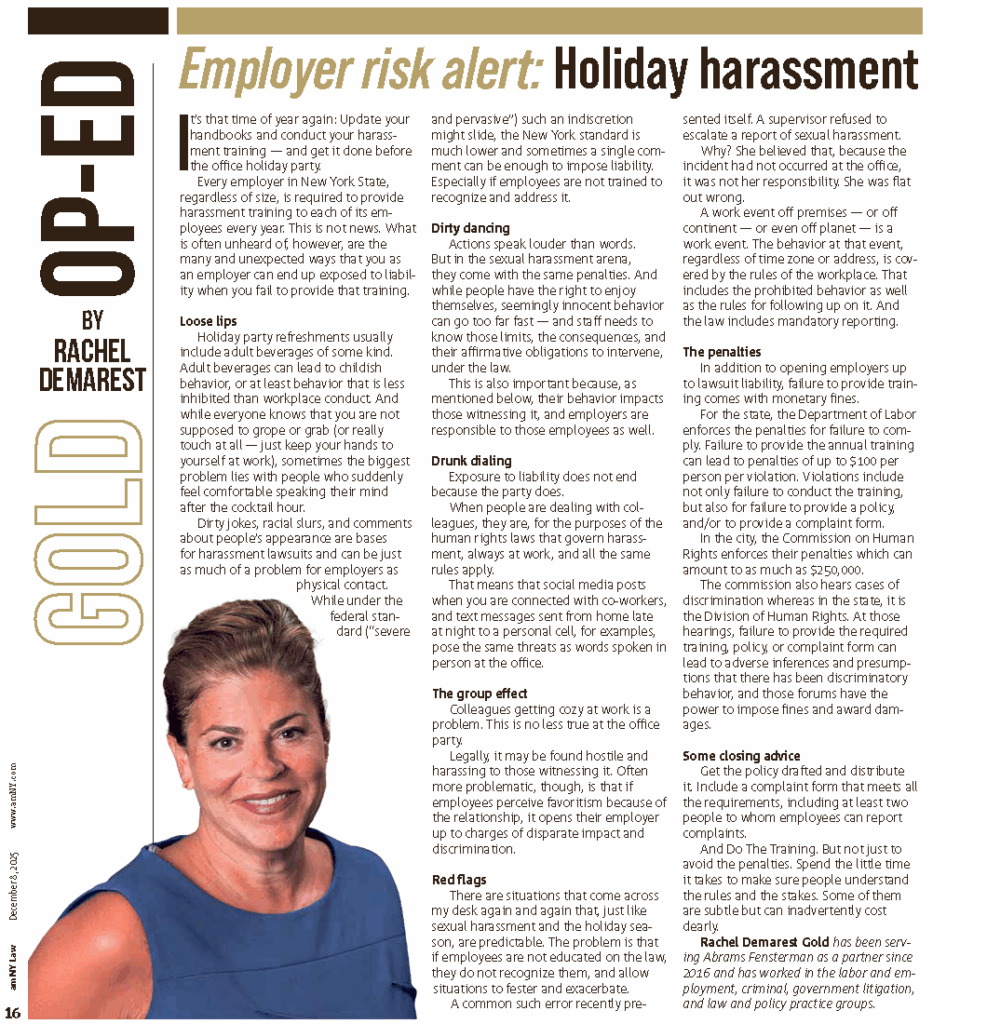Law360
By Jeff Overley
Law360 (April 17, 2019, 7:36 PM EDT) — The U.S. Department of Justice’s newly launched campaign to shrink its False Claims Act docket has hit surprising turbulence as federal judges scrutinize the DOJ’s willingness to look the other way on alleged fraud and its disparagement of a company that specializes in bringing FCA cases.
The latest and most dramatic setback occurred Monday when an Illinois federal judge delivered a sweeping rebuke of the DOJ’s move to dismiss one of a dozen suits filed by a whistleblower company alleging pharmaceutical industry kickbacks.
The ruling from U.S. District Judge Staci Yandle rejected the government’s assertion of an “unfettered right to dismiss” FCA suits, deemed its investigation weak, questioned its tolerance of drugmaker freebies and suggested that its dismissal request may reflect hostility toward the whistleblower.
Attorneys have since marveled at the ruling, saying it casts doubt on the DOJ’s prosecutorial discretion and its so-called Granston memo, which emerged last year and directed government lawyers to more rigorously weed out FCA suits that don’t seem wise or worthwhile.
“This decision could signal a big turning point,” said Derek Adams, a partner at Feldesman Tucker Leifer Fidell LLP and a former DOJ lawyer. “I was surprised by it.”
The FCA empowers the government to deep-six cases despite objections by whistleblowers, who are also known as relators. It has long been assumed that the DOJ’s authority in that regard is immense, but the government historically has targeted fewer than 1% of whistleblower cases for dismissal, and it has usually done so on technical grounds, so its authority hasn’t been tested much.
There have been, however, divergent rulings from the D.C. and Ninth circuits on how much power the DOJ possesses. The D.C. Circuit’s so-called Swift decision recognized the “unfettered right to dismiss,” while the Ninth Circuit’s so-called Sequoia Orange decision required a “valid government purpose” that would be served by dismissal.
No courts have recently concurred with Swift, but two decisions this month — one by Judge Yandle and another by a Pennsylvania federal judge — have embraced Sequoia Orange.
“This strengthens the view that the Sequoia Orange standard — one that places some basic requirements on government dismissal authority — is gaining increasing traction across the country,” Healy Hafemann Magee partner John R. Thomas Jr. said.
The trend is especially notable because courts are not merely holding the DOJ to a largely symbolic standard that can be satisfied with some trivial reason for dismissal. Instead, they are demanding evidence that the DOJ diligently examined fraud allegations and reasonably decided that the allegations should no longer be pursued.
For example, in a case called Thrower v. Academy Mortgage, a California federal judge last year determined that the government “did not fully investigate” whistleblower allegations and therefore could not terminate the case. The DOJ has appealed, calling the decision “improper and unprecedented.”
The ruling this week by Judge Yandle seemed even bolder, finding “no rational relationship” between the government’s stated desire to protect its enforcement prerogatives and its proposed dismissal of kickback allegations targeting Belgian drugmaker UCB Inc. According to Judge Yandle, the allegations described a “classic violation” of the Anti-Kickback Statute, and the government’s dismissal request was therefore “curious at best.”
“Judge Yandle’s ruling follows the very recent trend of courts demanding more from the Justice Department to support qui tam dismissal motions, but it also takes that trend to a new level by sharply criticizing the Justice Department’s proffered justifications for dismissal,” Jennifer Wollenberg, special counsel at Fried Frank Harris Shriver & Jacobson LLP, told Law360.
Making matters more striking, Judge Yandle jabbed the DOJ for criticizing the investigative methods of a relator company, the National Healthcare Analysis Group, that has filed a dozen largely identical suits against drugmakers. That criticism makes it plausible that the “reasons for the decision to dismiss are pretextual and the government’s true motivation is animus towards the relator,” Judge Yandle wrote.
Some observers found that accusation far-fetched, noting that the government has pursued countless FCA cases involving kickbacks.
“Given DOJ’s zealous prosecution of all forms of kickbacks over the years, it … seems quite a stretch to suggest that DOJ is allowing kickbacks here because of a suspected animus toward the relator,” said Kenneth Abell of Abrams Fensterman Fensterman Eisman Formato Ferrara Wolf & Carone LLP.
But it’s also not clear why the DOJ felt compelled to drag the NHCA Group’s name through the mud, given that concerns about its investigative methods seem like a peripheral issue.
“I don’t see any basis in the law for them to say, ‘Well, we can decide which relators we like and don’t like,’” Greenspoon Marder LLP senior counsel Ron Lebow said. “It does suggest that it’s almost entirely born out of animus.”
Abell added that denigrating the whistleblower “seemed to give the judge ammunition,” and that “it would be wise for DOJ to focus on the merits” in its future requests to dismiss FCA cases.
The government, however, has already filed several other motions to dismiss that accuse the NHCA Group of amassing inside information under “false pretenses,” an allegation the investor-backed company has called “wholly gratuitous” and “legally irrelevant.” The motions are pending in Pennsylvania, Texas and Washington federal courts, raising the prospect of divergent decisions that could exacerbate a circuit split on the DOJ’s dismissal decisions.
The unusual circumstances — a deep-pocketed whistleblower company with cases all over the country and a major financial interest at stake — have some attorneys wondering whether the stage is being set for a lengthy legal battle that could ultimately reverberate across the FCA realm.
“It’s the perfect situation where we’re going to see this go up through the circuits,” Adams said, “and then ultimately could be decided by the Supreme Court.”
–Editing by Philip Shea and Aaron Pelc.





